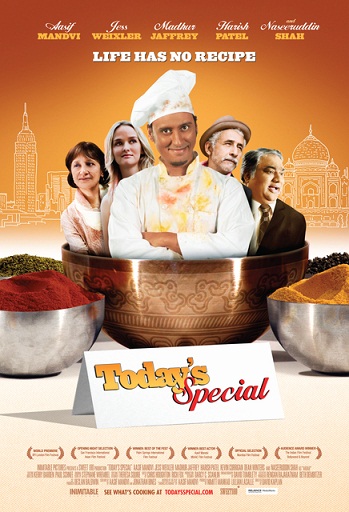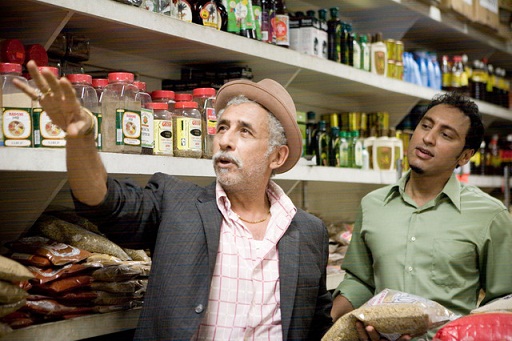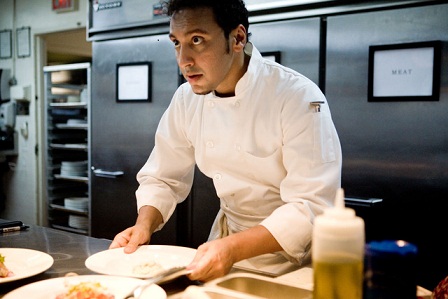On August 9, 2006, actor-comic Aasif Mandvi started a job that he had auditioned for only five hours before. It was the first of the New York performer's many bogus reports from the simulated corners of the globe for The Daily Show.
From watching the clip, you can tell that Mandvi and the rest of the crew didn't have much prep time. You can hear host Jon Stewart pronounce Mandvi's first name differently each time, a mistake that hasn't been repeated in the 4½ years that followed. Mandvi has been either a Senior South Asian Correspondent or a  Senior Muslim Correspondent. The producers can't seem to decide, but what he has been able to do is mercilessly skewer misperceptions about both groups with a look of unflappable fatuousness.
Senior Muslim Correspondent. The producers can't seem to decide, but what he has been able to do is mercilessly skewer misperceptions about both groups with a look of unflappable fatuousness.
Mandvi's success on the series could hardly be considered a fluke, and his résumé is dense and varied. You can spot him Analyze This, Spider-Man 2, It's Kind of a Funny Story, Ghost Town, Robert Altman's Tanner on Tanner and The Last Airbender.
He's joked that he's played a long line of doormen and doctors, but his stage work is even more eclectic. He's the first Muslim actor to play Persian trader Ali Hakim on Broadway in Oklahoma!, appeared in Tony Kushner's Homebody/Kabul and Tom Stoppard's On the Razzle and received an Obie (an Off-Broadway Tony) for his one character play Sakina's Restaurant.
He's also been a big screen leading man. He played the title character in Merchant-Ivory's The Mystic Masseur and has earned critical raves for co-writing (with former Daily Show screenwriter Jonathan Bines) and starring in Today's Special. The film opened in the U.S. last October and is headed for DVD in March. The film's official site,www.todaysspecial.com, lists screening information and release dates.
Mandvi plays Samir, a frustrated haute cuisine chef who has to take over his father's struggling Indian restaurant when the old man has a heart attack. In the process, he learns how to make his ancestral dishes from a moonlighting cab driver (Naseeruddin Shah, Monsoon Wedding) and finally wins the heart of a fellow chef (Jess Weixler, Teeth). For a film that features food so prominently, it's only fitting that Bollywood legend and celebrity chef Madhur Jaffrey plays Samir's mother.
Mandvi called me from New York on the Monday before The Daily Show's final broadcast of the year. Through two very different venues, The Daily Show and his new film, he's been able to explore how Desi (or South Asian) Americans fit into the country as a whole.
Congratulations on the reception you've had so far on Today's Special. It's a major accomplishment to have a film with 78 percent positive rating on Rotten Tomatoes.com.
It's 79 percent (he was correct). It's great. I'm thrilled with the critical response but also with the audience response, which is ultimately what you make movies for.
How did you adapt Sakina's Restaurant to what eventually became Today's Special?
We didn't really rework the story. The story is very different. The two projects are only connected by the fact that one inspired the other in the sense that Sakina's Restaurant is about a family that runs an Indian restaurant, and this movie is about a family that runs an Indian restaurant.
But other than that, it's like we took the characters in Sakina's and completely transformed them. Some of the characters may have the same name, but they're different characters. We made the movie much more about food, and we played up the romance angle. Sakina's was just a jumping off point for the film really.
One of the things that's impressive about the film is that you've landed some first-rate talent to work with you, particularly with Ms. Jaffrey and Mr. Shah.
We were very lucky to get them. Madhur had always been involved with the film since these very early readings that we did of the screenplay. She was someone I had always intended to cast in that role. Naseeruddin Shah came along much later in the process. We were trying to get a Bollywood star to play that role, and a lot of people were not available. We scoured Bollywood, looking for every major star, and no one was around.

Naseeruddin Shah (left) and Aasif Mandvi in Today's Special. ©2010 Reliance Mediaworks, used by permission.
And then finally, he was the one person we could get to. We were finally able to get to him, and we got him the script. He's kind of at the point in his life where he only works if it's something he wants to work on. He doesn't really do that many projects. He gets a lot of projects that are just standard Bollywood fare. He turns down a lot of stuff. He kind of said to us I only work on projects that are exciting and interesting.
He read our script, and he loved the script, but he also loved the character, Akbar, and he felt that he could have real fun with it, and we let him. He brought a great deal to it. As a writer, I had one impression of Akbar, and then when he showed up, he brought a whole other dimension, another impression to it. He created a whole character that I had never seen. It was really kind of exciting to see that.
This is a deeply personal project for you, but in many cases a film like this is dismissed as a vanity project. How were you able to avoid that?
Not to dissect it too much, but I think that the movie has a tremendous heart. It's a real story.
Even though I star in the movie, and I intended to star in the movie, it wasn't really about me starring in the movie. It was mostly about this story that we wanted to tell. Because we had a story that we really wanted to tell, which for me is about integration and about a first generation Indian-American who is integrating himself and discovers something that I have discovered in my own life, which is that until you reconcile the things that you have rejected, you can't really become whole.
That story, I think, transcends culture. It transcends a lot of things. It takes it out of the elements that could make it a vanity project into something that people can relate to.
The film reminded me of the tension that exists in my own German-American family. A lot of my relatives are Dunkards, or Old German Baptists. If you go to our gatherings, you'll see people who look like ordinary WASPs, but you'll also see women in bonnets and men with beards down to their bellies.
Sounds like a gathering at my family reunion.
Your career has gone on for a lot longer than most people realize, and you've had a greater range of roles. For example, in the Off-Broadway play Einstein's Gift, you successfully played Fritz Harber, a German physicist.
I know, a German, Jewish physicist. I have been very fortunate in that a lot of people who know me from The Daily Show are always surprised when I pop up in (The Last) Airbender or that I've made a movie like Today's Special that doesn't have the same kind of tone or humor as The Daily Show. People don't realize that I've been doing this for almost a decade or more.
I've had the opportunity to play a lot of roles. I've got to play a German physicist. I got to play in the musical Oklahoma!. I got to work with Merchant-Ivory. It's been a career that's had many different faces, but I love that.
I think I get bored doing one thing too long, even with The Daily Show. If I keep doing comedy for too long, I want to get back to explore more dramatic work and stuff like that. If I do that for too long, I want to get back to the yuks. I've always gone back and forth.
Even with The Daily Show, each correspondent has his or her own character. When he was on The Daily Show, Stephen Colbert referred to his character as a "well-intentioned, poorly informed, high-status idiot." The character you play on the show is much different. How would you describe him?
I don't know. It's something that has come up a lot. I'm always interested in what other people see. I'm not that conscious of it. I try not to say too much because I feel that then I'm too self conscious of it. I know that when I am most effective on that show, I'm standing on the fence between cultures and my character is speaking from both sides of the culture, east and west simultaneously. Those are the best pieces and often have the most impact.
I think all the characters on The Daily Show are kind of idiots. They're all clowns in their own way. I think that my guy is a kind of "other" character. It's almost like he's an alien. It's like he's hanging out with these humans and he doesn't quite get them. There's that kind of element to it. But I try not to think about that too much. I'm always curious about how it lands on other people. What do you think of it?
I think he has this sort of bemused detachment whenever he hears Washington spin. Like there's a moment I remember from your debut where you were supposed to be in the middle of Beirut and a bomb went off. You said, "That was just an 'Improvised Explosive Opportunity.'"
That's what I mean. There is a kind of detachment where I'm looking it from above and commenting on the ludicrousness of both sides. I think that's what my character does often.
In an interview that you granted to a Huffington Post blogger named Wajahat Ali two years ago, you expressed some ambivalence about the roles available to Desi actors. How have things changed in the last two years?
I'm just impressed that you're using the word "Desi" (laughs). I think it has changed in the sense that there are more roles today being offered than there were 10 years ago, but we still need to break certain stereotypes. For all the roles that are out there, a majority of them are still about the foreignness or otherness. I think I would like to see more roles for South Asian performers that are more inclusive and part of the American Diaspora, the American tapestry, perhaps the way that African American and Hispanic roles have developed.
You were born in Mumbai, but you grew up in the England and Florida. What was the transition like for you?
It was interesting. It is part of who I am. I was born in Mumbai, but I grew up in England, and then my adulthood has been in the States. I'm an American, stuffed with an English person with an Indian person inside. I feel like those things kind of inform me in some way, which I think helps me as an actor. I'm not burdened with a lot of patriotism (laughs).
I'm free to see things objectively because I don't consider myself American, and I don't consider myself British or Indian. I'm kind of an amalgam or mongrel of a lot of different places and experiences. In a lot of ways it's been a good thing for me. It's enabled me to do what I do on The Daily Show.
The thing about America I've found, growing up in England as an Indian kid and an immigrant, no matter how long you live there, no matter how much you try to be inside that culture, you'll always be considered an outsider. The British have this very strong history and tradition, and they will always look at Indians, Pakistanis and those people as outsiders.
Whereas in America something else happens, which is that there's an inclusiveness, a sense that we're part of one big American melting pot. Actually, everybody conforms with your uniqueness, your ethnicity, your cultural background. You'll find that you sort of melt into this Americana. There's a kind of encouragement to actually scrutinize the long traditional heritage that you come from, instead of just following it.
You find in a movie like Today's Special really is about going back and reclaiming something that you had given up. Samir ultimately believes that he has to follow this dream, this path that has been set forth and give up this heritage, that in the movie is represented by food, this idea of going back and reclaiming who you are in order to become whole. It happens in America because it's sort of the history of American immigration, that psychology of immigration in America.
You had an important dramatic role when you played former Guantánamo detainee Moazzam Begg, who is a British-Pakistani citizen, in Guantánamo: Honor Bound to Defend Freedom on Broadway.
Off-Broadway, my paycheck certainly indicated that distinction.
Doing that play was really a remarkable thing because, I'm embarrassed to say that I didn't know that much about what was really going on in Guantánamo. There was the narrative that was being spun by the Bush Administration and the British Administration at the time, and the reality on the ground for a lot of those prisoners (was different). The play talked about the British detainees that were being held there. It was remarkable, and it was really heartbreaking.
It was kind of surreal to play a character who I was portraying in his prison cell on stage in New York every night while he, the real man, was actually sitting in a prison cell in Cuba during the run of the play (Begg was released in 2005). I felt that I had a responsibility to him in some way. You're not just playing someone when you're playing Henry VIII, a historical figure, a real person. You're portraying a real experience on stage, which was very, very bizarre.
What did you do when you were working at the Disney-MGM theme park in Orlando, Florida?
That was my first gig out of college. We were cast as improvisational street performers. It was actually where I got a lot of my basic improv training and stuff was in that cast of characters, portraying archetypal Hollywood types from the 1930s: gossip columnists, cab drivers, police officers, all of these citizens of Hollywood. So we were a cast, and it's still there.
It's "Streetmosphere," it's on the main Hollywood Boulevard of the MGM studios. It was a great experience because it was my first gig out of college. It was a great training ground for improv and comedy. A lot of those people who were part of that later went on to Mad TV and have had careers in comedy.
That explains how you pulled off the audition for The Daily Show. Weren't you performing on the show within hours of the audition?
Basically, I auditioned at 1:00 in the afternoon, and Jon (Stewart) offered me the job right there. I was on the show. I was rehearsing at 4:00 that afternoon, and I was on the show at 6:00 o'clock that evening. It all happened so fast that people didn't even know that I was on the show until they saw it that night at 11:00 (EST) that evening. I didn't even have time to tell people. Some close friends of mine made phone calls to very close friends of mine and my parents because I was on The Daily Show. It was a crazy day. It was one of those moments in life that define the next phase of your life. It did that for me.

Aasif Mandvi in Today's Special. ©2010 Reliance Mediaworks, used by permission.
What do you think was accomplished through the Rally to Restore Sanity and/or Fear?
Everybody's sane now, so that's good. It restored sanity, so our job here is done.
I think it was more of a collective experience. Two hundred thousand of our fans showed up, and I think it was a cathartic experience for them. Often our show offers a catharsis for people to express their frustrations. I think satire does that. Occasionally, you may change something, and that's amazing. I think people showed up almost in solidarity in supporting that call, supporting that idea. It was impressive for that explosion. It was an awesome feeling to actually stand on that stage, I have to say, to look at 200,000 people. I thought to myself, this is something that only Mick Jagger gets to do, you know.
